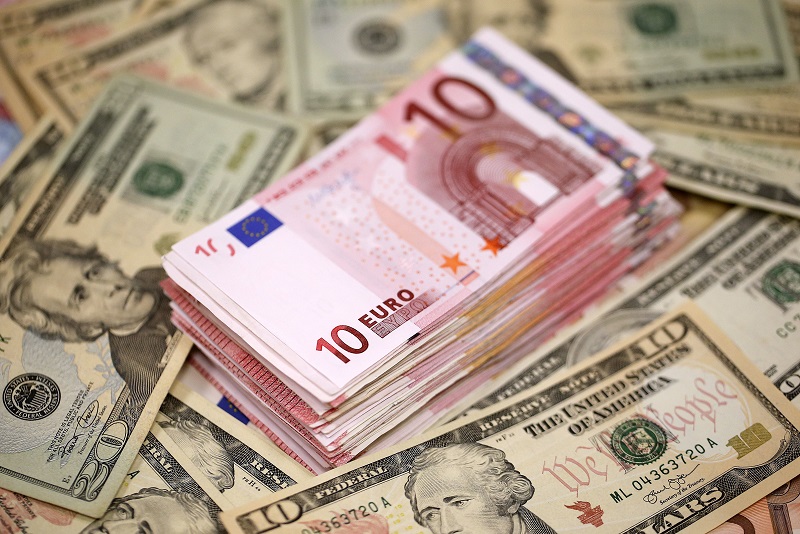The Iranian government has decided that the euro will be used instead of the U.S. dollar when giving the national currency’s exchange rate in all official statements and accounts amid a currency crisis in the Caspian country.
On April 18, in a cabinet meeting chaired by Iranian President Hassan Rouhani, all ministries, governmental organizations and companies were ordered to use the euro instead of the U.S. dollar as the main foreign currency in their statistical reports and financial data, Iran’s Tasnim news agency reported.
The Central Bank of Iran was also told it must announce and manage the value of the national currency, the Iranian rial, against euro.
The decision came at a time when Iran’s relations with the U.S. have been strained due to imposed sanctions on Iran. The Iranian rial had hit a record low against the U.S. dollar last week, for the second time in two months, prompting some currency dealers to suspend trading. Now, Iran is trying to reduce the country’s reliance on U.S. currency.
In recent weeks, the U.S. dollar jumped to 60,000 rials in the open market in Tehran while it was worth 36,000 rials in mid-September.
According to Iran's Deputy Police Chief and Spokesman Saeed Montazer al-Mahdi, for preventing speculative activities in Iran’s currency market and supporting authorized bureaux de change over 70 uncertified money exchange shops have been closed, while dozens of speculators have been arrested.
On March 26, the head of economic committee in Iran’s parliament Mohammad Reza Pourebrahimi, claimed that Iranians have transferred $30 billion out of the country during the last few months, and did not specify how the money has been moved out. Iranians do not have access to the international banking system, as American banks are prohibited from processing any Iranian transactions.
Pourebrahimi also criticized the actions taken by the Central Bank of Iran to curb the rapid devaluation of the rial against U.S. dollar as erroneous, and said that the measures have created more tension in the market.
According to Hamshahri, an Iranian newspaper, the situation in the Iranian foreign exchange market has further deepened the crisis in the banking sector, especially through the issuance of new bonds with a 20 percent annual interest rate, in an effort to withdraw liquidity from the overheated foreign exchange market. The Central Bank’s interference in March 2018 caused a total of $1.67 billion of additional loss to Iranian banks, the paper added.
In January, the Iranian parliament approved the inclusion of a clause in the fiscal 2018-2019 budget to clear a total of $11.5 billion of debt involving a multi-stakeholder debt swap between the government, the Central Bank, branch banks, social security organizations and private contractors. The government’s debt to the banking sector stood at $15.1 billion as of December 2017.
U.S. President Donald Trump has set May 12 as the deadline for his decision on whether to pull out of the 2015 nuclear deal, which allowed Iran’s economy to re-engage with world trade; the anticipation has positioned Iran to develop closer banking cooperation with European countries.
However, major European banks have been cautious about engaging in transactions with Iran because of U.S. sanctions and fear of violating those sanctions. The Financial Action Task Force, a multinational watchdog, has declared Iran as a country with “high risk and non-cooperative jurisdictions,” and advises countries to tell their banks to impose extra due diligence on transactions with Iranians. Transfers can only occur through unconventional ways, such as exchange dealers or international travelers.







 Azerbaijan and Armenia started the process of demarcation of their border on Tuesday, with the installation of the first border markers based on ge...
Azerbaijan and Armenia started the process of demarcation of their border on Tuesday, with the installation of the first border markers based on ge...
 President Aliyev emphasized the critical role of the North-South Transport Corridor in fostering transport cooperation between Azerbaijan and Russi...
President Aliyev emphasized the critical role of the North-South Transport Corridor in fostering transport cooperation between Azerbaijan and Russi...
 Armenian sappers commenced on Monday mine-clearance operations in the territories adjacent to the Saint Mary Church in village of Voskepar (Armenia...
Armenian sappers commenced on Monday mine-clearance operations in the territories adjacent to the Saint Mary Church in village of Voskepar (Armenia...
 Russian Foreign Minister Sergei Lavrov has reasserted that Moscow has no intentions to stop the fighting in Ukraine, even if peace talks commence.
Russian Foreign Minister Sergei Lavrov has reasserted that Moscow has no intentions to stop the fighting in Ukraine, even if peace talks commence.
 Iran has refuted reports of alleged damage to Shimon Peres Negev Nuclear Research Centre located southeast of Dimona, Israel, during the recent air...
Iran has refuted reports of alleged damage to Shimon Peres Negev Nuclear Research Centre located southeast of Dimona, Israel, during the recent air...
 Iran’s Foreign Minister, Hossein Amir-Abdollahian, has labeled a foiled Israeli drone attack in certain parts of the country as a "failure" for Isr...
Iran’s Foreign Minister, Hossein Amir-Abdollahian, has labeled a foiled Israeli drone attack in certain parts of the country as a "failure" for Isr...



